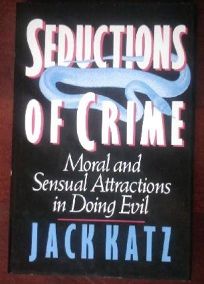Many of my blogs and videos are written from the perspective of a criminal psychologist. As a researcher, I want to examine crime and criminal behaviour so I can understand or explain behaviour. Much of this is done by conducting large scale studies and categorising behaviour in various ways. Some of the work involves working out what the likely characteristics of offenders are.
I have said on many occasions in the past that criminals are not a unique subset of individuals. They are amongst us. They are our brothers and sisters, mothers and fathers and so on. I have also said that we need to focus on the actual behaviours and interactions between victims and offenders to understand the psychology of it. However, a researcher named Jack Katz proposes a very different theory of how we should examine crime.
Katz wrote a book called the seductions of crime in 1988. It was and still is, seen as a fairly controversial view of criminality. Katz begins the book by asking the reader to reflect on the reasons they act in the way that they do, what propels them to act in certain ways in various contexts? He suggests it comes down to motivation. The invisible forces that attract us to interact or repel us away from interactions. For example, I went to visit my mother because I hadn’t seen her for a while. The underlying motivation to that is I wanted to make her happy which in turn made me happy and resulted in a pleasurable experience.
Similarly, I avoided going to the shops on Christmas eve because I knew it would be really busy and people might be bumping into one another and there wouldn’t be much left anyway. The underlying motivation here would be that I wanted to avoid an unpleasant stimulus by not going. This is the same reason I would not go and get involved in a fight.
Standard theories in criminology and psychology have attributed certain characteristics to offenders. For example, they come from a disadvantaged background, they were abused when they were younger, they have learned to react violently. However, if these are the only factors that cause criminality, then why are these people not committing crime every single minute of every single day? Katz suggests that there must be some underlying force that propels them to act when they do.
To put it simply, Katz suggests that offenders act ‘because they like it’. When talking about property crimes such as vandalism and burglary, Katz calls it the ‘Sneaky Thrill’. He suggests that these property crimes appeal to young offenders independent of the material gains that are made. One particular example he uses is of two young boys aged 14 and 16 driving around and spotting a pizza delivery driver. The older one said it would be so easy to steal those pizzas and they took them. They told how they spent no time thinking about it or discussing it, they weren’t even hungry but enjoyed the pizza because of the way they had got it.
There are countless examples of crimes being committed because of enjoyment. Often young people will break into a property and take items which are of little or no use to them. These items are sometimes discarded and are sometimes kept as souvenirs. They didn’t break in and take the goods because they wanted them or needed them, they simply broke in because it was exciting and stimulating.
Think of when you were a child and one of your parents told you that you were not allowed a particular treat. If the other parent sneaks it to you and says you can have it, it normally tastes so much better because you were told you couldn’t have it.
I have spoken in the past about the escalation in violence in serial killers. At first, only a minor act would be enough to cause excitement. For example, if a murderer strangled a victim to death they may find it highly stimulating and they would produce high levels of adrenaline. As the offender kills more victims, he needs a higher level of stimulation to get the same level of adrenaline and might be more violent with the victim.
The view that offenders commit crimes because of the excitement or enjoyment they gain from it may be controversial. However, it is understandable that please can drive people to act in this way. In the same way that pleasure can sometimes drive criminal behaviour, so to can the avoidance of negative consequences. Young people who vandalise or break into properties may be avoiding being bored.
I have seen this behaviour from a very personal point of view. I once knew a fairly wealthy middle-aged woman who used to go and do her shopping and steal some of it. She paid for some items and stole others. She used to tell me that she found it very exciting and it wasn’t about the items that she stole, but about the excitement and the fear of getting caught.
In a large scale study that I conducted with the general public some years back, one of the items on the questionnaire was ‘have you ever had sex outdoors?’ People often scored the highest on this particular item. I discovered that 68% of 225 people had sex outdoors on at least one occasion. Again, this is likely to be because of the excitement of getting caught.
In conclusion, I do not think that people commit crimes solely based on gaining pleasure or avoiding negative impacts. However, I do think that it can explain some of the motivating factors to offending. Obviously, most of us live by social norms and limit the things we do because they are against the law. Some people are more likely to live by social norms and follow the law than others. I believe the pleasurable aspects of offending certainly influence some individuals.

